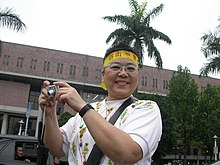Josephine Ho
| Josephine Ho | |
|---|---|

Josephine Ho in 2007
|
|
| Native name | 何春蕤 Ho Chuen-juei |
| Born |
16 June 1951 Taiwan |
| Nationality | Taiwanese |
| Occupation | Academic, feminist |
| Known for | Activism for sexual and reproductive health and rights, sex-positive feminism |
| Spouse(s) | Ning Yingbin 甯應斌 |
| Website | sex |
| Academic background | |
| Alma mater | National Chengchi University |
| Academic work | |
| Discipline | Cultural studies |
| Main interests | Sexuality |
| Josephine Ho | |||||||||||||||||||||
| Traditional Chinese | |||||||||||||||||||||
|---|---|---|---|---|---|---|---|---|---|---|---|---|---|---|---|---|---|---|---|---|---|
| Simplified Chinese | |||||||||||||||||||||
|
|||||||||||||||||||||
| Transcriptions | |
|---|---|
| Standard Mandarin | |
| Hanyu Pinyin | Hé Chūnruí |
| Bopomofo | ㄏㄜˊ ㄔㄨㄣㄖㄨㄟˊ |
| Wade–Giles | Ho Ch`un-jui |
| Tongyong Pinyin | Hé Chūnrueí |
| Yue: Cantonese | |
| Jyutping | Ho4 Ceon1 jeoi4 |
| Southern Min | |
| Hokkien POJ | Hô Chhun-jôe |
Josephine Chuen-juei Ho, is the chair of the English department of National Central University, Taiwan, and coordinator of its Center For the Study of Sexualities.
She has withstood lawsuits directed at her outspokenness on gender and rights issues.
She holds a Bachelor of Arts degree from the National Chengchi University, a Master of Science degree from the University of Pennsylvania, a Doctor of Education degree from the University of Georgia and a Doctor of Philosophy degree from Indiana University.
In April 2003, an article appeared in the China Times claiming that Ho's website had several pages that not only covered the topic of zoophilia, but actively promoted the practice, with images. 13 conservative groups collectively filed a complaint accusing Ho of making obscenities available to children. This sensationalism led to thirteen Christian and conservative organisations collectively filing a complaint with the Taipei District Court. The process lasted for over one year, with a not guilty ruling returned on 15 September, 2004. The reason being that the zoophilia pages were only one part of the website's essays and reports, thus the incorporation of some pictures did not constitute an obscenity.
The incident has been seen as an example of sensationalist media and received international attention as a perceived confrontation between conservative aspects of Taiwanese society and sexual freedom.
...
Wikipedia
